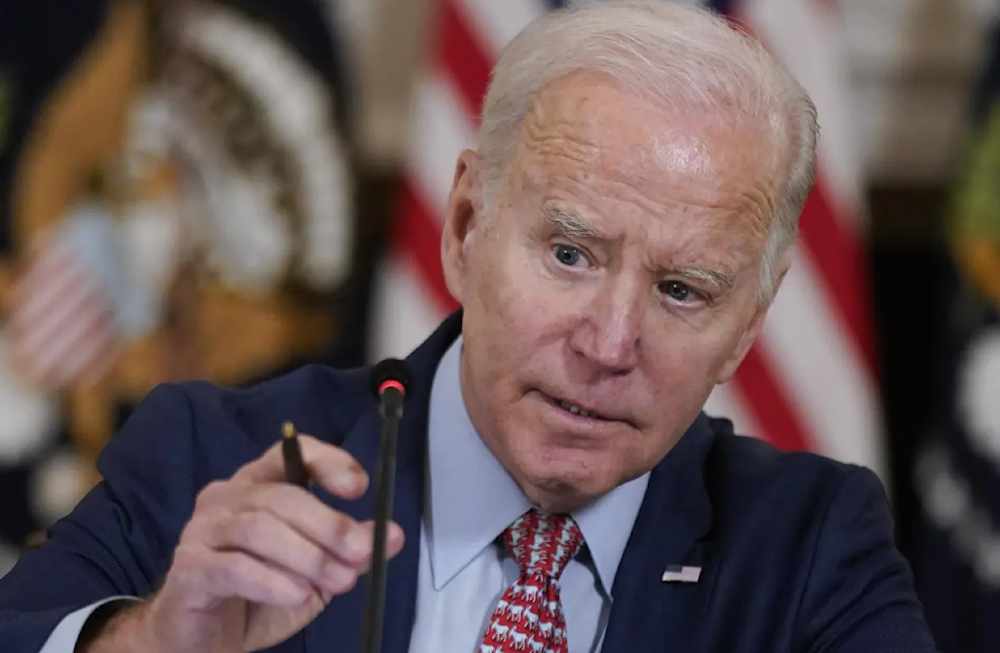Biden discussed plans to strike Iran nuclear sites: Axios
Sources told Axios that some of Biden's aides, including Sullivan, believe that the alleged degradation of Iran's air defenses and missile capabilities by "Israel" gave Biden an opportunity to strike.
-

President Joe Biden adjusts his mic during a meeting in the State Dining Room of the White House on April 4, 2023. (AP)
Three sources divulged to Axios that White House National Security Advisor Jake Sullivan presented US President Biden with options for a potential US strike on Iran's nuclear facilities, should Iran develop a nuclear weapon before Donald Trump takes office.
Biden and his national security team recently discussed various options regarding Iran's nuclear program, but no final decision was made. The meeting, held about a month ago, was not prompted by new intelligence but rather as part of "prudent scenario planning" for potential US responses if Iran escalates its nuclear activities.
Some of Biden's closest advisors have argued privately that the acceleration of Iran's nuclear program and the war that the Axis of Resistance had endured provided Biden with both a need and a chance to attack.
Sources told Axios that some of Biden's aides, including Sullivan, believe that the degradation of Iran's air defenses and missile capabilities, as well as significantly weakening allies would increase the chances of a successful strike while lowering the risk of Iranian retaliation and regional escalation.
On the threshold?
One source divulged that Biden focused on the subject of urgency, namely whether Iran had taken actions that justified a massive military assault only weeks before a new president enters office.
At a conference in New York two weeks ago Sullivan asserted that by observing statements of Iranian officials in recent months, the US should wonder whether to change its doctrine.
According to the International Atomic Energy Agency (IAEA), Iran has enough 60%-enriched uranium to build four nuclear weapons but if it decides to do so, it will need to create a nuclear explosive device or warhead. Israeli intelligence says it will take at least a year.
However, US and Israeli officials allege that over the last year, Iranian scientists have conducted "suspicious" nuclear weaponization research, including computer modeling and metallurgy, that appears to be aimed at reducing the time required to develop a nuclear device.
Last Spring, the Biden administration confidentially expressed severe worries about Iranian nuclear research and development operations, according to US and Israeli sources.
Sullivan stated last month that the Biden administration updated President-elect Trump's team on the intelligence picture around Iran's nuclear program and revealed that although Trump's administration may have a different strategy, "I want to make sure we are starting from a common base of what we are facing with respect to the threat posed by Iran's nuclear program."
Last month, Dr. Kamal Kharrazi, the head of Iran's Strategic Council on Foreign Relations, discussed pivotal regional issues with Al Mayadeen, including the possible change to Iran's nuclear doctrine.
Questioned about his earlier statements to Al Mayadeen where he warned Iran might reassess its nuclear doctrine and whether "the time has come" to do so with Trump's inauguration looming on the horizon, he stressed that Iran opposed nuclear weapons but hinted at potential countermeasures. "If they take steps against us, it's natural for us to respond with proportional measures at the appropriate time," he said, leaving the door open for strategic recalibration.

 3 Min Read
3 Min Read








